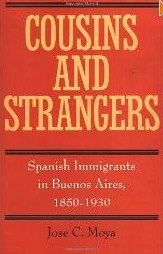José C. Moya
Cousins and Strangers
 University of California Press, 1998
University of California Press, 1998
The story of Self-Reliant Free Spirited People
Much as I was afraid of delving into this huge sociological study of Spanish immigration to Buenos Aires (1850-1930), it did not take an hour for me to realize that I had hit on a precious pearl. Granted this is not a popular history, nor is it an assay on historical issues, it is strictly hard sociology, with data, charts and the works. But my, what a talent this man has had putting all this information into a legible and even sometimes amusing text. Meant for the academia, it broke the mold and spilled out to the general readers' shelves. Justifiably so.
Being a Spaniard myself, from this same land of Galicia, with plenty of ties to our diaspora, Argentine and otherwise, I have an irresistible curiosity to understand the hows and whys of those people generations ago, who decided to leave, who chose for the unknown rather than the comfort of one's own mediocre living, or those lacking what it took and sat back with resignation. I wanted to know not only the hardships and physical adventures they willingly chose to go through, and the kind of lives they were willing to forsake, family ties, homes, home cultures (or their lack, rather); what I wanted to find out, really, is what went on in the back of their minds, in the innermost spot of their souls that made them (them as opposed to the rest who stayed behind) leave. Migrating seems to me as the closest thing to the transmigration of one's soul. I mean this, if one has no say about the family and culture into which he is born, the whole set of circumstances, maybe migrating to a distant and foreign land has to do with it. Maybe its our way of making a statement. I understand it so. And while one part of him cannot forfeit his memories of home, and carries them like a cross to the grave, another part of his ambivalent soul longs for the new life, the one started with rebellion, like a self-made Adam.
Well, I kind of found an answer to what I wanted to know. There is history big and small, city history and citizens' histories with names and faces. Mr. Moya does not show us cold numbers, and does not waste our time, more than enough, with sociological jargon; here is enough to satisfy the haughty intellectual and humble reader Joe or Pepe. Above all Moya the writer comes out as a friendly voice leading us through what might have been a hard road indeed. His mastery of the subject lets him speak with immense common sense, what most intellectuals would have avoided with haughty pretense. His love of the subject shines through. Here's a conclusion drawn from a clear mind: “Immigrants were not simply pawns at the mercy of impersonal forces; rather they were willful agents normally within the restraints of structures and the bonds of the past.” Trying to find out why an illiterate laborer moved into a certain place in Buenos Aires instead of another place he is wise enough to understand that such person would have given us one answer -if asked: “Because my cousins lived there”, for instance; but that wouldn't be the total picture: there are invisible forces that are the object of sociology that make up for the paucity of words of the respondent. And that's the sociologist's work, not the novelist's.
Close to my heart came this sentence: “the Mataronese (people from a town in Cataluña, were) the least communal of the groups and the closest thing to the liberal image of immigrants as self-reliant free spirits and individualistic trailblazers.” I couldn't help being intrigued by this group, the one that indubitably suits my soul. There were many other groups that stuck to their “birth-given” clans, in more or less degree. That is, they moved to another world but carried the old with them. Instead, the Mataronese achieved the rare feat in my personal view: they were the somehow curseless ones, the Adams prior to the curse.
In any case, it's a microcosm, this book is. It helps understand people; why we are so different and make so varying choices in life. The author-s narrative technique is not Marxist, he does not easily explain away man's choices as the result of his social circumstances, unfair, of course. No, it's not only the circumstances that make us, it's us too that are to be blamed or to be praised. In the end one still has reason to ask, after seeing the big picture and looking into the lives and choices of so many people from different backgrounds: what made them leave, though? And what made many others never do it? Opportunely enough, at the beginning of the book one learns that those who left were not the poorest and most illiterate, they were the most adventurous, the ones who had heard stories of far away lands and of possibilities, and whose imagination and dreams had been aroused to heights unscouted before. Go and populate the world; you shall leave your father's house... Oh boy, how low governments have made us fall; we are bred like cattle, fed with welfare and taught by the leftist media who has tamed us, and nobody dares to dream anymore. Only now there are no more Buenos Aires and no more Americas to go to, not as they once were, anyway.
